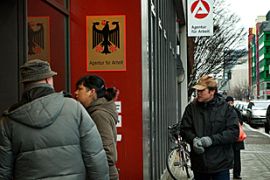Eurozone pulls out of recession
Deepest recession since second world war ends after positive growth in third quarter of year.

The eurozone economy had shrunk by 0.2 per cent between April and June after a record collapse of 2.5 per cent in the first three months of the year.
But growth of 0.7 per cent in Germany, Europe’s most powerful economy, and 0.3 per cent in France, in the third quarter lay behind the improvement.
Momentum
Britain, with a 0.4 per cent contraction and Spain, with a 0.3 per cent decline, contributed to the lower figure for the EU as a whole.
The European figures compare with a 0.9 per cent improvement in third-quarter economic output in the United States, with Japan having already exited from recession in the second quarter with 0.6 per cent growth.
Howard Archer, the chief economist at IHS Global Insight, poured some cold water on the news when he said the the emergence into daylight came “at a trot rather than a canter”.
Cautioning that “consumer spending likely saw little or no growth,” Archer warned that the recovery “could well lose momentum for a time in 2010 before growth starts to gradually pick up again”.
But he forecast overall eurozone growth of one per cent in 2010.
Clemente De Lucia of BNP-Paribas, a French bank, said the rebound was due mainly to the industrial sector and warned that the recovery “might fade next year” once the impact of schemes, such as help for boosting new car sales, was fully withdrawn.
He also pointed to high unemployment, running at more than 22 million at the last count across the EU, acting as a brake on expansion for some time yet.
Stimulus
Nervous consumers, meanwhile, fear a double-whammy of rising repayments on loans and rising prices when the drip-feed of state economic support is eventually scaled back.
The global credit crisis forced EU governments to plough trillions of dollars into faltering banking systems and other direct stimulus programmes in a bid to drive the economy forward.
Brussels released figures drawing on national input from 17 EU nations on Friday, with 10 showing growth and seven still contracting.
Lithuania, the Baltic former Soviet republic, recorded the biggest upturn at six per cent, a massive swing from its previous 7.7 per cent contraction.
Neighbouring Estonia showed a 2.8 per cent decline.